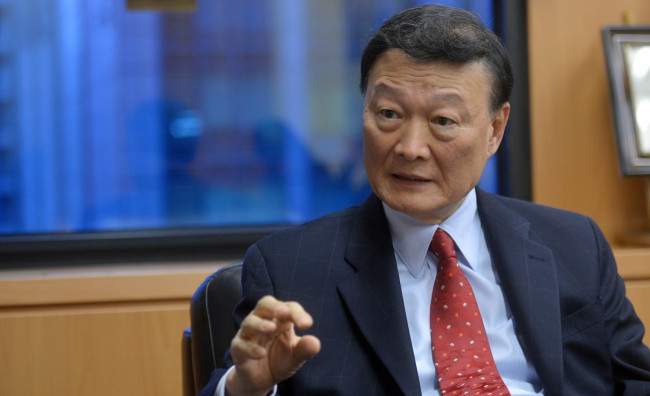Korea is heading to level playing field for nation branding: Koo
New nation branding commission chief seeks to brand Korea by putting together fragmented images
By 박한나Published : Nov. 14, 2012 - 18:06

If you have second thoughts about a shirt you were thinking of buying after seeing the “Made in Korea” label, the chances are that you are unconvinced by Korea’s progress.
What eliminates the hesitation is improvement in the nation brand, says Samuel Koo, chairman of the Presidential Council on Nation Branding, who assumed office last month.
“It’s not about the quality of the shirt. The country of origin could make people refuse the purchase or sometimes willing to pay more for it,” he told The Korea Herald on Monday.
Koo said Korea’s nation brand was advancing into the “level playing field” where people look beyond negative images about Korea and show curiosity about what the country is really like, which could lead to positive connotations.
“Korea has long been linked to ‘poverty,’ ‘war-stricken,’ ‘orphan’ and ‘dictatorship,’ which painted a dull picture of the country’s image. It was natural in a way because all the news limelight we have had were on such issues.
“But look at us now: We are enjoying the highest level of freedom and individual independence in Asia, have seen a remarkable success in the economy and are a de facto death penalty-free country, which is rare in other parts of the world,” he said.
Koo said the branding council’s primary role is to link the seemingly unrelated factors and build up the image of Korea, ranging from economy to culture and politics.
“For instance, there are fragments of positive sides of Korea -- world-class enterprises such as Samsung, the jaw-dropping achievements at the Olympics, the international success of entertainers including the Korean pop sensation Psy and more. But not many people can tie those individual factors to the country, Korea. That’s what we are doing -- promoting them in a large cluster and molding them into a nation brand,” he said.
The former Korea Herald journalist who went on to head English-language satellite TV station Arirang and the Seoul Tourism Organization admitted that it will take time to replace the negative image of the country with a fresh and positive one. But he is in no hurry.
“Let’s take the U.S. Civil War for example. It took quite a long time for people to brush off the dark side of the war -- the substantial number of casualties, the devastation of facilities and others -- and remember its core spirit of liberty and equality only. Other great images that we now have about other countries have been piled up for centuries. In a sense I think we are on a rather fast track,” he said.
Whether the government should take over the molding process of nation branding is still debated, but Koo said it was necessary to a certain extent. He referred to his early days in Rome as a U.N. official as an example.
“It was the early 1970s and there were about three to four Chinese restaurants in the city. When I left there in 1974, there were dozens. I heard that the Chinese government encouraged migrants to open diners,” he said. “And I am sure that citizens of Rome started learning Chinese culture from there.”
Government-led campaigns such as “Malaysia, Truly Asia” that have been hailed as remarkable successes have also proven that to a certain extent the government needs to contribute to the process. But what Koo really envies is the foreign governments’ long-term plan for branding.
“Malaysia is preparing for the year 2050 and Japan has a long-term plan, too. We need more than that -- an extensive strategy and careful planning,” he said.
In such efforts, official development assistance and support from the private sector for charity is what Koo and his council are keen on at the moment. Koo has established World Embrace, which is dedicated to supporting the lesser-known international organizations fighting against famine, poverty and diseases.
The branding council is also supporting the dispatch of “World Friend Korea,” a Korean version of the U.S. Peace Corps consisting of youth volunteers, to developing countries. Koo said it is a win-win strategy for Korea and for other countries.
“Some might say ODA is a simple giveaway. But in reality it is building grounds for the next generation of Koreans to reach out to the world. Those who have met with WFK and befriended them will always hold Korea and Koreans in their hearts,” he said.
He added that those countries will welcome Korean youths looking for jobs and new experiences in another environment.
“And when you get there, you’ll be asked what food we have, about our history, and our traditions. Tell them. They will listen with care and perceive Korea in their own ways. That’s what I call nation branding,” he said.
By Bae Ji-sook
(baejisook@heraldcorp.com)




![[KH Explains] No more 'Michael' at Kakao Games](http://res.heraldm.com/phpwas/restmb_idxmake.php?idx=644&simg=/content/image/2024/04/28/20240428050183_0.jpg&u=20240428180321)




![[Grace Kao] Hybe vs. Ador: Inspiration, imitation and plagiarism](http://res.heraldm.com/phpwas/restmb_idxmake.php?idx=644&simg=/content/image/2024/04/28/20240428050220_0.jpg&u=)








